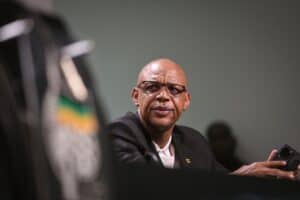A conversation with Chad Thomas is like listening to a true crime podcast.

Don’t be a bad guy. Period. Because if you are, forensic private investigator Chad Thomas will catch you. Complex financial crime is his game.
His company, IRS Forensic Investigations, is a successful agency that focuses on restitution for its clients and serves up justice to criminals who may have thought that donning a suit guaranteed immunity.
A conversation with Thomas is like listening to a true crime podcast.
Billions of rands are at stake and, he said, state capture’s quantum has nothing on what gets extorted, stolen, embezzled and swindled in the private sector.
In the 20-something years, he’s been a private investigator, crime has become frequent, and the numbers, frightening.
“When we had our first case that topped a hundred million [rands], we couldn’t believe it. Then we had a case for five hundred million. We couldn’t believe it. Now, some cases top the scale at billions of rands.”
He added since the pandemic fraud has rocketed worldwide.
“Whether it was PPE (personal protective equipment) related or just people who wanted to find a second form of income by investing their savings to try to get a quick return in a Ponzi scheme … we’ve seen fraudsters take advantage of all major black swan events that have occurred throughout the world.”
A black swan event is an unpredictable event which is not normally expected of a situation, and it has severe consequences at its business end.
Examples include the 2001 Twin Towers terrorist attack, flooding and World War I.
Thomas’ office is constantly busy, people filing in and out of the boardroom, giving statements, laying complaints, opening cases and more. Investigators are hectically busy tracking, tracing, unpicking and unravelling webs of intrigue and motives, and following the money.
Thomas loves what he does.
He is passionate about justice and it’s been a lifelong journey.
He started his career in the military police and was intimately involved in protecting South Africans during the 1994 elections, focusing on counter-intelligence against the right-wing element that attempted to destabilise the country’s move to democracy.
He moved into the private sector and ended up investigating financial crimes for a banking group, internally and externally.
A giant leap of faith landed him in a partnership with a security company as a fully-fledged private investigator after which, natural progression led him to do his own thing.
IRS was spawned, and it’s been the ride of his life. His life partner Glenda Paul later joined him.
Thomas focuses on helping people and companies, veering away from large institutions like banks which already have in-house forensics.
“This is where fraud could have a devastating effect on their lives and livelihoods, it could be catastrophic. It could be business-ending for them and in some instances, it’s been life-ending. People have committed suicide because of fraud.”
For him, the best part is when clients get their own back.
“When everything you believe has happened is proven to be true – in other words, all the intelligence gathering results in actionable evidence that the state can use to prosecute and a client gets financial restitution – there’s no better feeling.
“The worst feeling is the constant thought that, as much as we are trying to make a difference, we are not keeping up with the amount of fraud that’s taking place.
“We never anticipated it would be to this extent. And we’re not talking state capture or PPE, we are talking about normal everyday South Africans getting handled in forex schemes, crypto schemes, getting handled in get-rich-quick schemes and Ponzi schemes.”
He’s saddened by the fact that crime has become a free for all.
Investigators like Thomas work hand in hand with the authorities and, he said, while the state has been making a concerted effort to investigate, prosecute and reduce crime, it’s hamstrung by resources.
The private sector, in this instance, plays an important role in supplementing these efforts.
“We are paid by our clients, which means additional hands on deck come to state agencies at no cost, and over the years we have developed a deep, positive working relationship with law enforcement.”
Support Local Journalism
Add The Citizen as a Preferred Source on Google and follow us on Google News to see more of our trusted reporting in Google News and Top Stories.






